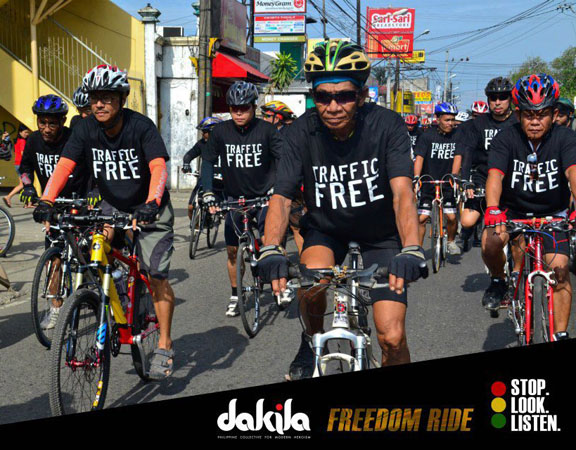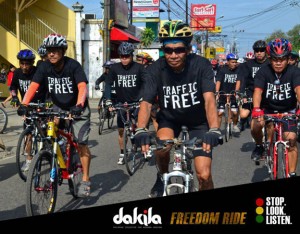
ZAMBOANGA CITY (Mindanao Examiner / Apr. 22, 2013) – Dubbed as one of the biggest and broadest bike tour ever held in Panay, some 500 cyclists gathered at the Freedom Ride for a Human Trafficking Free Philippines in Iloilo province in central Philippines.
The campaign mobilized students, nongovernmental organizations, artists, sports and lifestyle enthusiasts, government officials and even participants from Manila and nearby provinces. The next Freedom Ride will happen on April 27 in Zamboanga City.
The Freedom Ride is organized by the artist collective, Dakila, a group creatively inspiring involvement in social transformation, in partnership with the Manila Fixed Gear, the Freedom from Debt Coalition Iloilo, Partido ng Manggagawa, and the Iloilo Folding Bike Riderswith the support of the Embassy of the Kingdom of the Netherlands, the Department of Justice Inter-Agency Council Against Trafficking and the Presidential Anti-Organized Crime Commission.
“A lot of people in the provinces fall prey to human trafficking because of the lack of information given to them. Iloilo is one of the more vulnerable provinces for labor trafficking especially with the number of Overseas Filipino Workers and seafarers coming from the province. Its proximity to Boracay and other tourist spots also make Iloilo a transit area for sex trafficking.”
“We are glad that the local government, nongovernmental organizations, the cycling groups, artists and advocates here in Iloilo have embraced the call to be Freedom Warriors. We hope that through the Freedom Ride more people here in Iloilo will learn more about human trafficking and contribute in the movement to stop modern day slavery,” Karen Bermejo, co-organizer and head of the Dakila Iloilo Collective, said in a statement sent to the regional newspaper Mindanao Examiner.
Every year around 300,000 to 400,000 Filipinos fall prey to human trafficking in our own country and abroad. The Philippines remains a source, transport and destination area for human trafficking.
In 2010, the Philippines was in danger of being downgraded to a Tier 3 status in the US Department of State human trafficking index for a poor performance in the fight against human trafficking and for being in the Tier 2-watchlist (a list that included countries having the most number of human trafficking victims and with less government efforts to stop forms of human trafficking) for two consecutive years.
This could have caused the withdrawal of some $700 million in non-humanitarian, non-trade related aid including grants from the millennium challenge program.
As a result of intensified efforts, the country’s status was upgraded a notch higher to Tier 2 in 2011 and maintained the status in 2012. Tier 2 countries are those, which have shown significant efforts to fight human trafficking but have yet to fully comply with standards set by the United States’ Global Trafficking in Persons Report.

